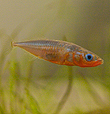Canadian researchers say their research shows tiny stickleback fish were able to develop tolerance for water significantly cooler than their ancestors within three years, a rapid adaptation that suggests evolution may help species survive the effects of climate change. By transplanting a species of ocean-based sticklebacks into freshwater ponds, the scientists replicated the transition of some sticklebacks from oceans to freshwater following the last ice age. And while those marine and freshwater counterparts had developed different physical and behavioral traits over 10,000 years, the scientists  observed that within three years some of the newly-transplanted fish adapted to water temperatures that were 2.5 degrees Celsius cooler, according to the study published in the journal Proceedings of the Royal Society B. “This made sense from an evolutionary perspective because their ancestors were able to adapt to freshwater lakes, which typically reach colder temperatures than the ocean,” said lead author Rowan Barrett of the University of British Columbia. But while the scientists say the results show certain members of a species can adapt to climate change rapidly, they concede that the numbers might not be enough to sustain the population.
observed that within three years some of the newly-transplanted fish adapted to water temperatures that were 2.5 degrees Celsius cooler, according to the study published in the journal Proceedings of the Royal Society B. “This made sense from an evolutionary perspective because their ancestors were able to adapt to freshwater lakes, which typically reach colder temperatures than the ocean,” said lead author Rowan Barrett of the University of British Columbia. But while the scientists say the results show certain members of a species can adapt to climate change rapidly, they concede that the numbers might not be enough to sustain the population.

Rowan Barrett/UBC
A marine stickleback